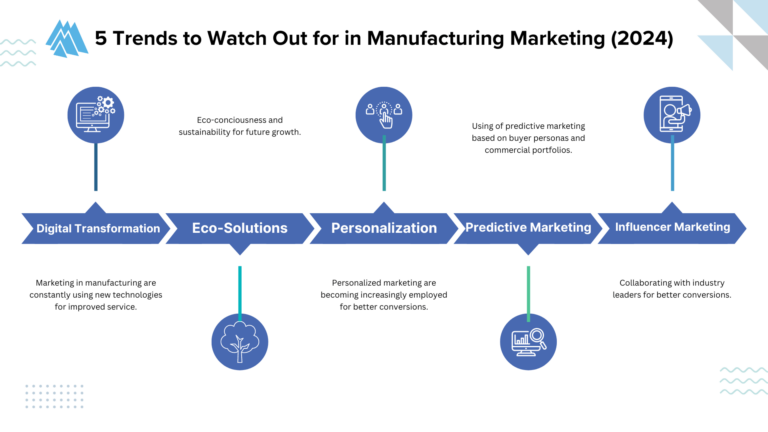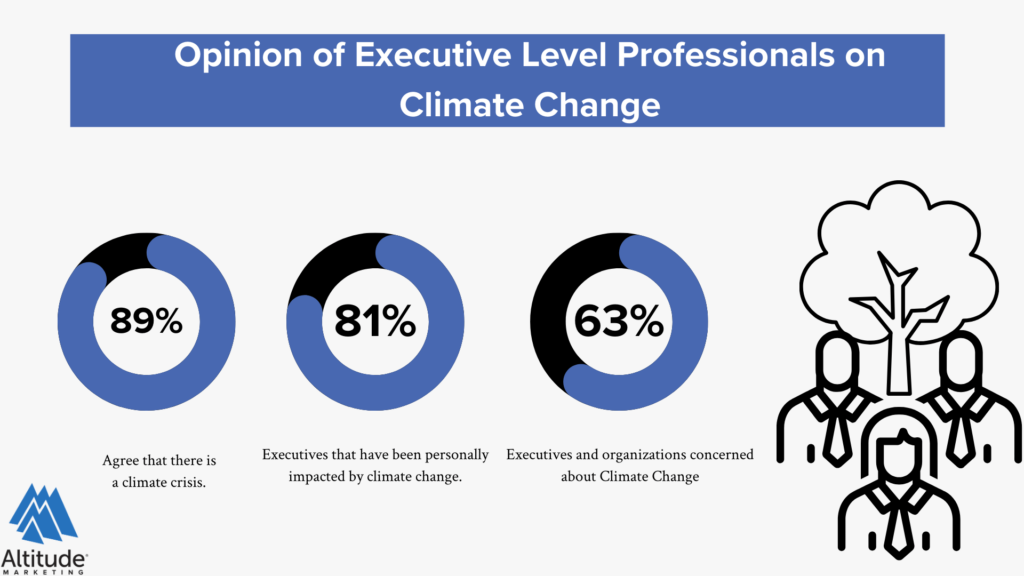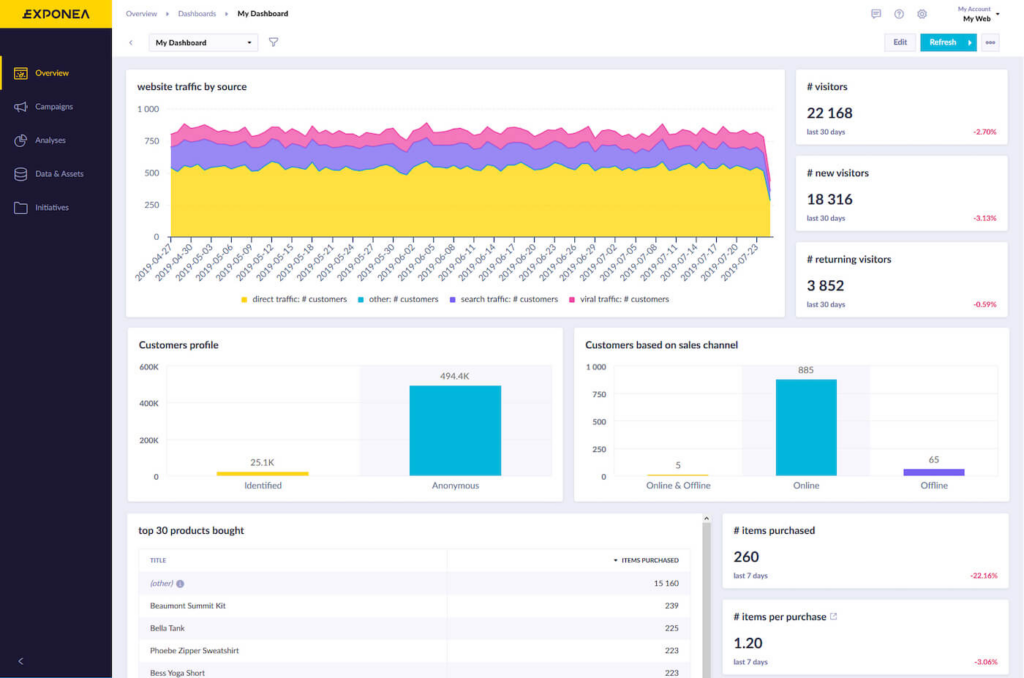Like the technology on your factory floor, marketing tactics have started to change quicker than ever. Emerging products like GenAI, automation, and larger concerns about data privacy mean B2B marketers cannot remain stagnant. The truth is–if you are using the same strategies six months from now, you might already be behind. Here, we look at five emerging marketing trends in the manufacturing space and how you can implement them to protect your market share and grow new leads.

5 Trends Transforming Manufacturing Marketing in 2024
Digital Tactics Change Faster Than Ever
Two years ago, GenAI was an abstract concept, without many practical applications for marketers. Now, it’s being used daily to help cut down on repetitive, mundane tasks (like SEO content idea generation, proofreading, and marketing automation).
The pace at which digital marketing best practices evolve is accelerating faster than ever. That means it’s crucial for your team to invest in training and education on a quarterly (if not monthly) basis to remain agile. Digital areas that will see large shifts in 2024 include
- Data privacy: The cookieless future is almost here, which means you need to adopt new tools and methods to message your target audience accurately. You’ll also need to ensure systems like your CRM and email marketing remain compliant as countries adopt stricter data laws.
- GenAI has practical applications: From creating sales decks to proofreading to sending personalized emails at scale, you can leverage AI in dozens of different ways to work faster and more efficiently. But attitudes about its quality and reliability continue to shift, meaning how you use it today will certainly differ in six or even three months.
- Virtual reality can expand your reach: Because B2B manufacturing products are incredibly complex, they are very difficult to showcase. VR’s quality and applications continue to improve, meaning you now have the ability to conduct product demos and training without being tethered to a physical location.

Sustainability and Eco-Friendly Practices
Manufacturing marketing is increasingly focused on highlighting the use of eco-friendly tactics and materials. This trend is driven by growing consumer awareness and demand for sustainable products. Manufacturers are emphasizing the incorporation of recycled, upcycled, or biodegradable materials into their production processes.
Your marketing should showcase efforts like environmental impact studies and contributions to circular economy initiatives. Building a consistent and engaging content marketing plan around your organization’s sustainability practices can reap significant rewards in both brand recognition and consumer loyalty.
By promoting energy-saving achievements, manufacturers aim to resonate with environmentally-conscious consumers and differentiate themselves in the market.
Significant commitments to reducing carbon footprints should be part of marketing strategies in 2024. By publicly setting targets for carbon reduction and sustainability goals, you demonstrate accountability and transparency to consumers and stakeholders.
Personalized Content Marketing
Content marketing, as an overall strategy, isn’t new. It’s still one of the most effective ways for you to build authority and trust. What’s changing? The level of targeting and customization.
You likely already have a wealth of data about your existing customer base. From demographics to digital behavior to sales cycle timing, you can take advantage of that information to execute content tactics like:
- Email nurture campaigns: Consistent, useful content that is delivered to your target audience’s inbox boosts your brand recognition. And it provides a compelling nudge to your target clients until they are ready to move to a deeper partnership.
- Retargeting: Ad engines on platforms like Linkedin offer powerful ways to deliver your messaging to likely leads–based on characteristics of your existing client base.
- Premium content campaigns: Lead generation through gated, premium content on your website is an effective way to capture potential customers.
By segmenting audiences based on demographics, interests, and online behavior, manufacturers can tailor their advertising content to resonate with specific customer segments. Whether through social media platform advertising, display ads, or search engine optimization marketing, targeted campaigns allow manufacturers to maximize the impact of their marketing channel efforts and achieve higher conversion rates.
Predictive Maintenance and Aftermarket Services
With IoT sensors, data analytics, and machine learning algorithms, manufacturers can predict equipment failures before they occur, enabling proactive maintenance interventions. That level of knowledge can morph into a powerful customer retention and upsell strategy. Your team will be able to time your communication based on actual product use, inserting your messaging when it’s most effective.
Service contract promotion is another significant trend shaping manufacturing marketing in 2024. Manufacturers are actively promoting service contracts to customers as a means of ensuring ongoing support and maintenance for their equipment. Marketing campaigns emphasize the value proposition of service contracts, including access to priority support, regular maintenance visits, and discounted repair services. Manufacturers may offer tiered service contract options to cater to different customer needs and budgets, with premium contracts providing additional benefits such as extended warranties and 24/7 support.
Manufacturers are increasingly focusing on value-added service offerings as a means of differentiating themselves in the market in 2024. Beyond traditional maintenance and repair services, manufacturers are expanding their service portfolios to include additional value-added services that enhance the overall customer experience. This may include services such as training programs, equipment optimization consulting, and performance analytics dashboards. Marketing funnel efforts should be centered around showcasing these value-added services and demonstrating how they can help customers maximize the value of their investments.
Influencer Marketing
Not just a technique for D2C businesses, influencer marketing is a growing strategy to build expertise. The main challenge: Defining and sourcing the right “influencer” in your vertical.
Manufacturers are partnering with engineers, designers, and other professionals who have expertise in relevant fields to endorse their products and share insights with their audience. These collaborations lend credibility to the brand and its products, as industry experts are seen as trusted sources of information within their respective fields. Through joint content strategy creation, such as product reviews, creating educational content, and behind-the-scenes looks, manufacturers can leverage the expertise and authority of these influencers to reach and engage with their target audience effectively.
This may include hosting live Q&A sessions, interactive workshops, or virtual events where influencers interact directly with the audience and provide valuable insights and advice. By fostering two-way communication and encouraging audience participation, manufacturers can strengthen brand loyalty, drive engagement, and increase brand awareness among their target demographic.
FAQs
What are the primary trends reshaping manufacturing marketing in 2024?
Key trends include digital transformation, sustainability initiatives, personalized content marketing, influencer marketing, and a focus on predictive maintenance and aftermarket services.
What role does sustainability play in manufacturing marketing trends for 2024?
Sustainability is a significant focus, with manufacturers highlighting eco-friendly materials, energy-efficient processes, and commitments to reducing carbon footprints. This is communicated through marketing campaigns and product labeling.
How can manufacturers stay competitive amidst these evolving marketing trends?
Manufacturers can stay competitive by embracing these trends, investing in digital technologies, demonstrating commitment to sustainability, personalizing marketing efforts, expanding e-commerce presence, leveraging influencer collaborations, and prioritizing ideal customer-centric aftermarket services.
Conclusion: Change Has Accelerated. Your Strategy Needs to Keep Up.
This year will bring key marketing trends, including digital transformation, sustainability and eco-friendly practices, personalized content marketing and influencer marketing. But the only constant in B2B marketing is that change will happen. Your focus shouldn’t just be on executing tactics that are effective today. You need to remain agile–able to learn, adapt, and improve so that your marketing strategy drives results into the next month and next year.
We help leading business-to-business brands hit their marketing goals. Get in touch to learn how Altitude Marketing can help you reach your peak performance.





